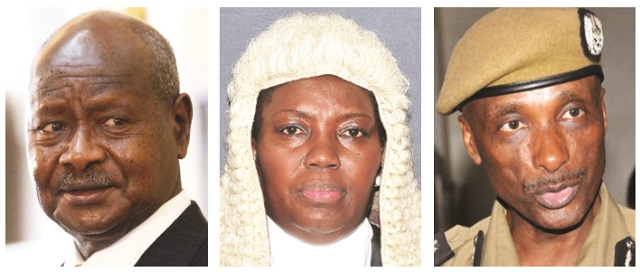
Age of rage
According to the latest Uganda Bureau of Statistics data, which stretches up to 2020, people aged between ages 15-49 are the fastest growing cohort in Uganda. Every year, the size of this category of the population expands by about 0.6 percentage or 350,000 people per year. Currently they are estimated to be about 45.8% of the population of 38 million people. By 2021, the time of the next general election, that figure will have expanded to about 47% or 19 million people out of a population of 41 million people. For many people, the anger exhibited in parliament is a warning of what could happen in 2021 if this group erupts.
Already, public rage against the lifting of the presidential age limit has led to violent protest in many towns across Uganda, including Lira, Mbale, Gulu, and Pader and universities; including Makerere in Kampala, and Kabale University in western Uganda. The mover of the motion, Igara MP Raphael Magyezi, has reportedly been forced to abandon his official home and is living under fear for his life under protection of the police. Another staunch supporter of the move, James Kakooza, narrowly survived being lynched in his constituency. His vehicle was vandalised. Another, Evelyn Anite has reported death threats to police.
Meanwhile, if the de facto leader of the opposition in Uganda, Dr. Kiiza Besigye, is the “champion of the politics of the angry”, then it can be said that more and more of his ardent disciples are taking up central positions in and outside parliament.
Within parliament, three of the most visible opponents of the age-limit Bill; Kyagulanyi, Nandala Mafabi, and Mubarak Munyagwa, are Besigye disciples.
Outside of parliament, one can count on pro-Besigye activists like Mohammad Segirinya to be violent. This short and stout activist wears the same angry face as Besigye as a badge of honour.
That anger and ability to display it has in the past seen him carry a huge TV set of about 20kgs on his head to parliament in a protest against a Digital Migration law. In another episode, he has carried an old, torn mattress to sleep at parliament in protest.
A day before the brawls at parliament, on Sept.26, he decided to fight. The previous day, he had while seated in a car recorded a video in which he asked an ordinary woman along the road what she wanted their leaders to do for them.
“I want you to fight for us,” the woman said, “They should not touch it (constitution). He (President Museveni) should pack up and go.”
Segirinya turned, looked into the camera and said: “I think you have heard, every one is saying no touching it. Today is war. It ends today. Let us attack.”
And attack he did. Donning a cream suit, red tie, red head gear and huge boxing gloves, Segirinya made a show of walking to parliament to fight proponents of the move to lift the age limit. But before he could reach his goal, as expected and as always happens to him, he was violently arrested, thrown on the back of a police pick up, and whisked off.
While episodes like these pass him off as a clownish character, they got Segirinya resoundingly elected to represent Kampala suburbs of Kawempe, Mulago and Kyebando as councilor at the powerful Kampala Capital City Authority (KCCA). Many now say that if he contests for a parliamentary seat in 2021, Segirinya might win and join his friend, Munyagwa, who was in 2016 elected Kawempe South legislator.
Segirinya and Munyagwa are part of a crop of politicians, especially in and around Kampala, who have mustered the public’s anger and surf its wave to end up in political offices. They are now using this anger to further court their voters by showing that they are fighting for them, observers say. Often times, they play to the gallery by dramatisation.
That is possibly why legislator Raphael Magyezi’s bid to table the motion seeking leave of parliament to prepare the bill expected to expunge term limits exploded into a fist fight in parliament—a first in that House’s history.
Speaker Kadaga expelled the MPs over chaotic scenes in parliament. They had protested the previous day in part because a government minister, Ronald Kibuule, had illegally entered the chamber with a pistol. It is not clear why Kibuule entered the chambers with the gun well knowing that the atmosphere was charged between the majority ruling NRM party and the opposition MPs.
The opposition MPs knew that they could not defeat the motion to lift the age limit for Museveni but they had vowed to go down fighting and were joined by a few MPs from the ruling party. They donned red bandanas, fez hats, and scarves and pocket-kerchiefs and shouted and sang noisily to frustrate tabling of the motion. Sept.27 was the third day of their rage. Although Speaker Kadaga had suspended 25 of them from the house, they refused to leave. That is when Museveni’s dogs of war swooped-in to drag them out, one-by-one, kicking and screaming.
 The Independent Uganda: You get the Truth we Pay the Price
The Independent Uganda: You get the Truth we Pay the Price



